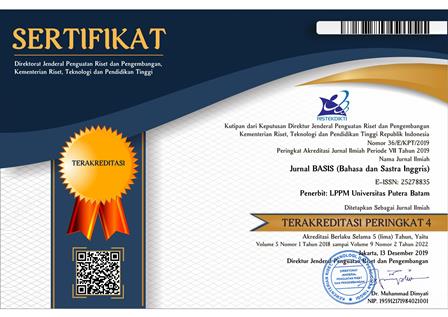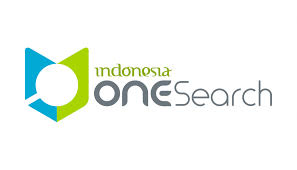EVALUATING TIN CASE CORRUPTION POTRAYAL IN THE JAKARTA POST: APPRAISAL FRAMEWORK
DOI:
https://doi.org/10.33884/basisupb.v11i2.9078Keywords:
analisis appraisal, jakarta post, korupsi, media beritaAbstract
The appraisal framework serves as the methodology to evaluate language in news articles, revealing journalists' and news media outlets’ nuanced expressions of attitudes, emotions, and engagement in their reporting. This study embarks on an exploration of the appraisal framework within a selection of four news articles from The Jakarta Post, each addressing the pervasive issue of tin case corruption, resulting in a staggering loss of 271 trillion Rupiah for Indonesia. This study employs a qualitative descriptive design, utilizing Martin and White's (2005) appraisal analysis framework within Systemic Functional Linguistics. The appraisal theory is applied to examine the news outlet's language in reporting on corruption cases. The findings suggest a predominant utilization of heterogloss (30%) and judgement (25%) which indicates a multifaceted approach characterized by the incorporation of diverse viewpoints and critical evaluations towards the corruption unfolding in the tin case. Notably, monogloss (17.5%) and graduation (17.5%) also feature prominently, reflecting a balanced discourse that encompasses both singular perspectives and nuanced expressions of intensity. Additionally, the usage of appreciation (5%) and focus (5%) is comparatively minimal, suggesting a lesser emphasis on acknowledging positive actions or delineating specific aspects within the coverage. This research illuminates the relationship between journalistic language and public perceptions of corruption, highlighting the need for critical evaluation of media coverage to promote informed discourse and enhance anti-corruption efforts.
References
Braun, V., & Clarke, V. (2006). Using Thematic Analysis in Psychology. Journal of Qualitative Research in Psychology, 3(2), 77-101. https://www.researchgate.net/publication/235356393_Using_thematic_analysis_in_psychology
Cavasso, L., & Taboada, M. (2021). A Corpus Analysis of Online News Comments Using the Appraisal Framework. Journal of Corpora and Discourse Studies, 4(1), 1-30.
https://DOI:10.18573/jcads.61
Chalimah, et al. (2022). Judgement Value on Corruption in Online News: Systemic Functional Linguistics. Journal of Forum Paedagogik, 14(1). https://doi.org/10.24952/paedagogik.v14i1
Charmaz, K. (2006). Constructing Grounded Theory: A Practical Guide through Qualitative Analysis. Sage Publications.
Charron, N., & Annonni, P. (2021). What is the Influence of News Media on People's Perception of Corruption? Parametric and Non-Parametric Approaches. Social Indicators Research, 153, 1139-1165. https://doi.org/10.1007/s11205-020-02527-0
Davies, S., Stone, L., & Buttle, J. (2016). Covering Cop's critical reporting of Indonesian corruption. Pacific Journalism Review, 22(2), 168.
https://DOI:10.24135/pjr.v22i2.61
Editorial Board. Reckless Mining Oversight. The Jakarta Post. Retrieved April 8th, 2024. https://www.thejakartapost.com/opinion/2024/04/08/reckless-mining-oversight.html
Editorial Board. Cicak vs Buaya Redux. The Jakarta Post. Retrieved May 29th, 2024 https://www.thejakartapost.com/opinion/2024/05/29/cicak-vs-buaya-redux.html
Elseddige, H. A. (2023). Evaluation of Newspaper Coverage of Political Corruption News in South Sudan. JKUAT Digital Repository. http://localhost/xmlui/handle/123456789/6092
Gallup. (n.d.). Corruption Continues to Plague Indonesia. Retrieved April 26th, 2024. https://news.gallup.com/poll/157073/corruption-continues-plague-indonesia.aspx
Halliday, M. A. K. (1985). An Introduction to Functional Grammar (1st ed.). Arnold.
Halliday, M. A. K., & Matthiessen, C. M. I. M. (2004). An Introduction to Functional Grammar. Arnold.
Janti, N. AGO Names Ex-official at Energy Ministry New Suspect in Timah Graft Case. The Jakarta Post. Retrieved May 29th 2024 https://www.thejakartapost.com/indonesia/2024/05/29/ago-names-ex-official-at-energy-ministry-new-suspect-in-timah-graft-case.html
Kramer, E. (2013). When News Becomes Entertainment: Representations of Corruption in Indonesia's Media and the Implication of Scandal. Media Asia Research, University of Sydney.
Lincoln, Y. S., & Guba, E. G. (1985). Naturalistic Inquiry. Sage Publications.
Malterud, K. (2001). Qualitative Research: Standards, Challenges, and Guidelines. Journal from The Lancet, 358(9280), 483-488.
https://DOI: 10.1016/S0140-6736(01)05627-6
Martin, J. R. (2000). Beyond Exchange: Appraisal Systems in English. In S. Hunston & G. Thompson (Eds.), Evaluation in Text: Authorial Stance and the Construction of Discourse (pp. 142-175). Oxford University Press.
Martin, J. R., & White, P. R. R. (2005). The Language of Evaluation: Appraisal in English. Palgrave Macmillan.
News Desk. (2024, March 30). AGO Uncovers Corruption in Indonesia's Tin Sector. The Jakarta Post. Retrieved on March, 30th 2024 https://www.thejakartapost.com/indonesia/2024/03/30/ago-uncovers-massive-corruption-in-indonesias-tin-sector.html
Peruzzotti, E., & Smulovitz, C. (2006). Enforcing the Rule of Law: Social Accountability in the New Latin American Democracies. University of Pittsburgh Press.
Prastikawati, E. F. (2021). Attitude Perspective in BBC News' Article: An Appraisal Analysis. Journal of English Language Studies. https://doi.org/10.30870/jels.v6i2.10280
Pramesti, O. L., & Arifin, P. (2017). Local Media in Covering Corruption (Framing Analysis on the Media Coverage on Corruption Case of Persiba Bantul Fund in Kedaulatan Rakyat, Tribun Jogja, Harian Jogja, Bernas Jogja and Radar Jogja newspapers), In International Seminar The Advancement of Media and Communication Technologies and its Impact on Economy, Politics, and Social Cultural Practices, 30 September 2017. URI:http://ejournal.uajy.ac.id/id/eprint/24239
Rose-Ackerman, S. (2003). Corruption. In C. K. Rowley & F. Schneider (Eds.), The Encyclopedia of Public Choice (pp. 67-76). Kluwer Academic Publishers.
Sandelowski, M. (2000). Whatever Happened to Qualitative Description? Research in Nursing & Health, 23(4), 334-340. https://doi:10.1002/1098
Saldana, J. (2013). The Coding Manual for Qualitative Researchers. Sage Publications.
Shenton, A. K. (2004). Strategies for Ensuring Trustworthiness in Qualitative Research Projects. Journal of Education for Information, 22(2), 63-75. https://DOI:10.3233/EFI-2004-22201
Situmeang, A., & Kurniawan, M.H. (2022). Evaluative Language Features on Hoax Related to Meth Drugs in dealing with Covid 19 Virus. Journal of Basis Volume 9 No 2 October 2022.
https://doi.org/10.33884/basisupb.v9i2.5607
van Dijk, T. A. (2009). Corruption and the Media: Framing the Public Discourse. Discourse Studies, 11(2), 137-163.
White, P. R. R. (2003). Appraisal Theory in Media Discourse. Text, 23(2), 259-284. Wiley Encylopedia

















